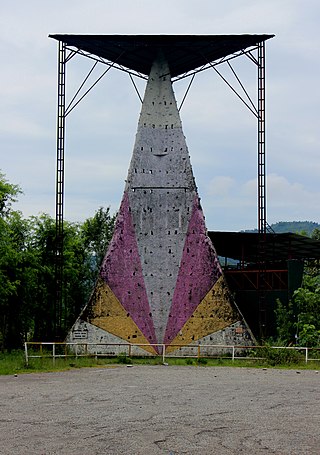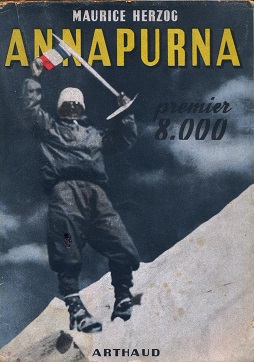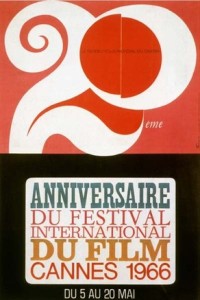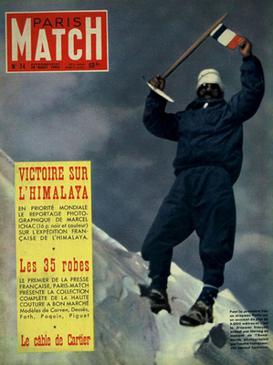Related Research Articles

Annapurna is a mountain situated in the Annapurna mountain range of Gandaki Province, north-central Nepal. It is the 10th highest mountain in the world at 8,091 metres (26,545 ft) above sea level and is well known for the difficulty and danger involved in its ascent.

Gaston Rébuffat was a French alpinist, mountain guide, and author. He is well known as a member of the first expedition to summit Annapurna 1 in 1950 and the first man to climb all six of the great north faces of the Alps. In 1984, he was made an officer in the French Legion of Honour for his service as a mountaineering instructor for the French military. At the age of 64, Gaston Rébuffat died of cancer in Paris, France. The rock-climbing technique, the "Gaston", was named after him. A photo of Rébuffat atop the Aiguille du Roc in the French Alps is on the Voyager Golden Records.
Louis Lachenal, a French climber born in Annecy, Haute-Savoie, was one of the first two mountaineers to climb a summit of more than 8,000 meters. On 3 June 1950 on the 1950 French Annapurna expedition, along with Maurice Herzog, he reached the summit of Annapurna I in Nepal at a height of 8,091 m (26,545 ft). Previously he had made the second ascent of the North Face of the Eiger in 1947, with Lionel Terray. He died falling into a snow-covered crevasse while skiing the Vallee Blanche in Chamonix. The mountain Pointe Lachenal in the Mont Blanc massif was named after him.

Maurice André Raymond Herzog was a French mountaineer and administrator who was born in Lyon, France. He led the 1950 French Annapurna expedition that first climbed a peak over 8000m, Annapurna, in 1950, and reached the summit with Louis Lachenal. Upon his return, he wrote a best-selling book about the expedition, Annapurna.

Lionel Terray was a French climber who made many first ascents, including on the 1955 French Makalu expedition in the Himalaya and Cerro Fitz Roy in the Patagonian Andes.

Marcel L'Herbier was a French filmmaker who achieved prominence as an avant-garde theorist and imaginative practitioner with a series of silent films in the 1920s. His career as a director continued until the 1950s and he made more than 40 feature films in total. During the 1950s and 1960s, he worked on cultural programmes for French television. He also fulfilled many administrative roles in the French film industry, and he was the founder and the first President of the French film school Institut des hautes études cinématographiques (IDHEC).
Jean Couzy was a French mountaineer. He studied aeronautical engineering at the École Polytechnique. At age 27, he was a member of Maurice Herzog's 1950 expedition to Annapurna. Prior to this, his usual climbing partner was Marcel Schatz, another member of the expedition. On the 1955 French Makalu expedition Couzy made the first ascent of Makalu with Lionel Terray on 15 May 1955.

Tony Louis Alexandre Aubin was a French composer.

Annapurna: First Conquest of an 8000-meter Peak (1951) is a book by French climber Maurice Herzog, leader of the 1950 French Annapurna expedition, the first expedition in history to summit and return from an 8000+ meter mountain, Annapurna in the Himalayas. It is considered a classic of mountaineering literature and perhaps the most influential climbing book ever written.

The 5th Cannes Film Festival was held from 23 April to 10 May 1952. As in the previous three festivals, the entire jury of this festival was made up of French persons, with Maurice Genevoix as the Jury President. The Grand Prix of the Festival went to the Two Cents Worth of Hope by Renato Castellani and Othello by Orson Welles. The festival opened with An American in Paris by Vincente Minnelli.

The 19th Cannes Film Festival was held from 5 to 20 May 1966. To honour the festival's 20th anniversary, a special prize was given.

The 20th Cannes Film Festival was held from 27 April to 12 May 1967. The Grand Prix du Festival International du Film went to the Blowup by Michelangelo Antonioni. The festival opened with J'ai tué Raspoutine, directed by Robert Hossein and closed with Batouk, directed by Jean Jacques Manigot.

Stars at Noon is a 1959 French mountaineering film directed by Jacques Ertaud and Marcel Ichac. It was entered into the 9th Berlin International Film Festival.

Jean-Marc Boivin was a French mountaineer, extreme skier, hang glider and paraglider pilot, speleologist, BASE jumper, film maker and author. The holder of several altitude records for hang gliding and paragliding, the creator of numerous first ascents and first ski descents in the Alps, a member of the team that broke the record for a sub-glacial dive and the first person to paraglide from the summit of Mount Everest, Boivin was a pioneer of extreme sports. He died from injuries incurred after BASE jumping off Angel Falls in Venezuela, the highest waterfall in the world.
Pointe Lachenal is a mountain in the Mont Blanc massif in the French Alps.

Armand Charlet was a French mountaineer and mountain guide.

Ang Tharkay was a Nepalese mountain climber and explorer who acted as sherpa and later sirdar for many Himalayan expeditions. He was "beyond question the outstanding sherpa of his era" and he introduced Tenzing Norgay to the world of mountaineering.

The 1950 French Annapurna expedition, led by Maurice Herzog, reached the summit of Annapurna I at 8,091 metres (26,545 ft), the highest peak in the Annapurna Massif. The mountain is in Nepal and the government had given permission for the expedition, the first time it had permitted mountaineering in over a century. After failing to climb Dhaulagiri I at 8,167 metres (26,795 ft), the higher peak nearby to the west, the team attempted Annapurna with Herzog and Louis Lachenal, reaching the summit on 3 June 1950. It was only with considerable help from their team that they were able to return alive, though with severe injuries following frostbite.

Francis de Noyelle was a French diplomat, born on December 9, 1919, in Paris, where he died on March 30, 2017. He was French ambassador to Nepal between 1980 and 1984.
References
- ↑ Biography at marcel-ichac.fr
- ↑ Il Cinema Ritrovato Cinetecadi Bologna
- ↑ Herzog, Maurice (1952) Annapurna E P Dutton & Co.
- ↑ Sadoul, Georges; Morris, Peter (1972) Dictionary of Film Makers University of California Press ISBN 978-0-520-02151-8 pg 121
- ↑ Leblanc, Gérard (1997) Scénarios du réel Volume 2:193-197 Editions L'Harmattan
- ↑ Rège, Philippe (2009) Encyclopedia of French Film Directors Volume 1:515 Scarecrow Press
- ↑ "IMDB.com: Awards for Stars at Noon". imdb.com. Retrieved 2010-01-10.